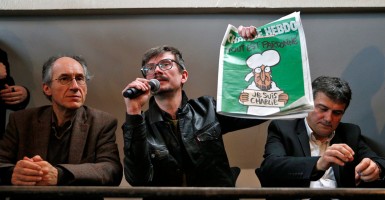Gérard Biard, editor in chief of Charlie Hebdo, criticized news outlets that chose not to republish the French satirical magazine’s controversial cartoons after the terrorist attack that left 12 people dead.
On Sunday’s “Meet the Press,” host Chuck Todd told Biard that his organization, NBC News, had made an “editorial decision” not to republish the images.
“What is your reaction to our decision and others who have chosen not to show your cover?” Todd asked.
Speaking through a translator, Biard said he was “critical” of news outlets that had the freedom to republish the cartoons and refrained:
“When they refuse to publish this cartoon, when they blur it out, when they decline to publish it, they blur out democracy,” says @Charlie_Hebdo_ editor
“Listen, we cannot blame newspapers that already suffer much difficulty in getting published and distributed in totalitarian regimes for not publishing a cartoon which could cause them, at best jail, and at worst, death. On the other hand, I’m quite critical of newspapers which are published in democratic countries.”
Biard said that the cartoon is not just “a little figure of Mohammed,” but a symbol:
It’s the symbol of freedom of speech, of freedom of religion, of democracy, and secularism. It is this symbol that these newspapers refuse to publish. This is what they must understand. When they refuse to publish this cartoon, when they blur it out, when they decline to publish it, they blur out democracy, secularism, freedom of religion and they insult their citizenship.
Biard said that Charlie Hebdo’s cartoons defend freedom of religion: “Every time that we draw a cartoon of Mohammad, every time that we draw a cartoon of a prophet, every time that we draw a cartoon of God, we defend the freedom of religion.”
Biard added that he believes God must remain a private rather than a public figure. He believes religion “has no place in the political arena” and defended “secularism” as the best guarantee of freedom, peace and democracy.
According to Biard, once religion “injects itself into the political debate,” the debate “becomes totalitarian.”
Charlie Hebdo’s first cover after the attack once again featured a depiction of Mohammed.






















